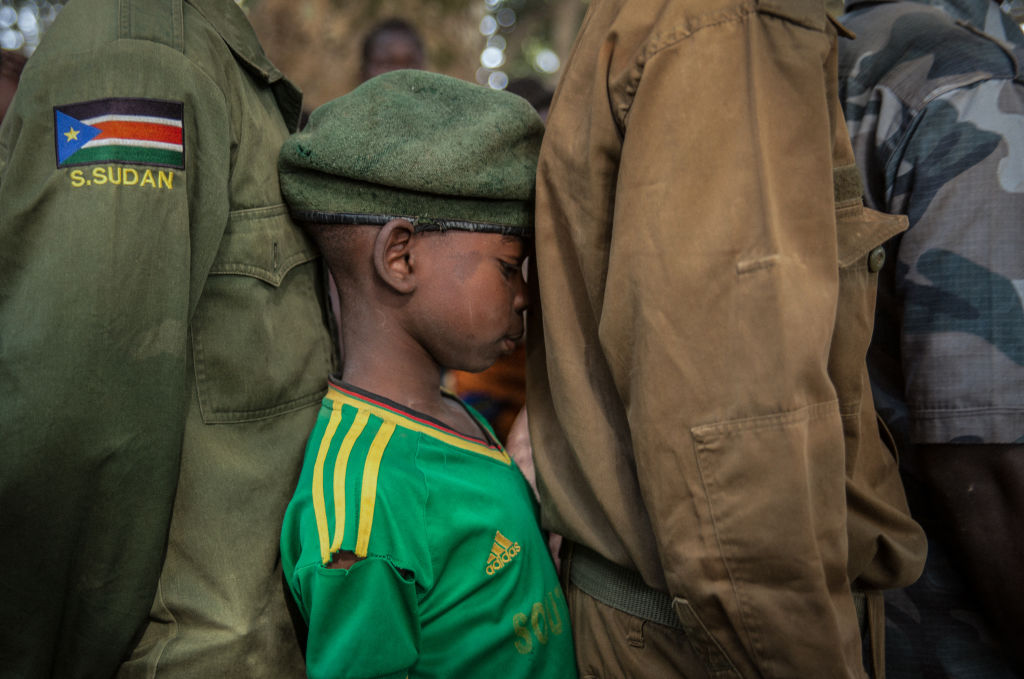ADF STAFF
Virginia Gamba recently raised alarms about the increase in state militaries and nonstate armed groups recruiting children across Africa, particularly in the Democratic Republic of the Congo, Mali, Mozambique, Somalia and Sudan.
“The cries of these children echo across conflict zones, but far too often, the world remains silent,” the United Nations Special Representative for Children and Armed Conflict said in a December 31, 2024, statement.
“Their pain is a stain on our collective conscience. We must do better, because every moment we delay, another child becomes just another number in the long list of conflict related casualties and violations in children and armed conflict reports.”
In 2023, 8,655 children were recruited and deployed in armed conflict, according to the last U.N. Secretary-General’s annual report on Children and Armed Conflict, published in June 2024.
The U.N. verified a “particularly high surge” of child recruitment, mostly by nonstate armed groups, and broke down the numbers in several African countries.
Central African Republic: 103 cases, including 23 instances of government and pro-government forces using children in support roles.
Democratic Republic of the Congo: 1,861 children, including 326 girls, were recruited and deployed by nonstate armed groups. The U.N. lauded “the continued absence of verified cases of recruitment and use by the Armed Forces of the Democratic Republic of the Congo and the Congolese National Police.”
Mali: 691 cases, including 79 instances of children used in support roles by Malian security forces. The U.N. expressed concern for the levels of recruitment of children and urged the military junta to criminalize their use.
Nigeria: 680 children, including 431 girls, were abducted, recruited and used by terrorist groups.
Somalia: 658 children were recruited and used, including 559 by the al-Shabaab terrorist group, 23 by regional government forces and 15 by government security forces.
South Sudan: 152 cases, including 65 children recruited and used by the South Sudan People’s Defense Forces.
Sudan: 209 cases, including 87 by the Rapid Support Forces. The U.N. reported 112 verified cases of children used in combat roles.
The U.N. report also noted 169 boys recruited mostly by terrorist groups in Burkina Faso and 40 children recruited and used by armed groups in Mozambique’s Cabo Delgado province.
Naomi Haupt, an anthropologist and researcher with the University of the Free State in South Africa, said that groups recruiting children violate their rights and international humanitarian law.
“Minors typically join armed groups through abduction or coercion — recruited as fighters, lookouts, porters, spies, cooks or sex slaves,” she wrote in a January 7 article for the Pretoria-based Institute for Security Studies. “Girls are especially vulnerable, compelled to work as spies, cooks and fighters. Some are forced to marry combatants.”
Haupt also said that there are major economic costs to countries where child combatants are used, describing significant difficulties for long-term national development.
“Missing out on schooling results in lost human capital and reduced productivity, contributing to long-term economic stagnation, decreased workforce participation, higher poverty rates and reduced foreign investment due to ongoing instability,” she wrote. “Countries also incur increased social service costs related to the healthcare and legal needs of former child soldiers, along with the social instability arising from reintegration challenges.”
Haupt urged African countries to reaffirm their commitment to protecting children and their support for disarmament, demobilization and reintegration programs.
The Convention on the Rights of the Child has been ratified by 196 countries, and 173 have ratified the convention’s optional protocol that prohibits recruitment of children under 18 years of age into armed conflict.
Comoros, Equatorial Guinea, São Tomé and Príncipe are the only African countries that have not signed. Liberia, Somalia and Zambia have signed but not ratified the agreement.
Despite several seemingly intractable conflicts on the continent where children continue to be deployed, Gamba remains hopeful.
“As we move into 2025, let us choose compassion over indifference and peace over war,” she said. “Let us prove to them that their wishes matter, that they matter. Together we can rewrite the stories of these children — not with fear and loss, but with healing and hope.”


